Introduction
Hypothesis
The main hypothesises that have been proposed is that students in multilingual groups are more willing to participate in group work and role play activities than student in monolingual groups. This study hypothesises: students in multilingual groups use target language and participate more actively in group work and role play activities, while students in monolingual groups are too shy to speak a foreign language and hesitate to take part in group activities.
Research Question
The main question of the research is “Do students in multilingual groups enjoy group work and role play activities more than students in monolingual groups?” In the modern globalised world people have numerous possibilities for education in any country they choose. While some of them search for the courses in their native language, others join multilingual groups. Both approaches have their benefits and drawbacks. In monolingual groups, students feel more confidence.
They understand everything their teachers and peers say to them. Nevertheless, they can experience difficulties in expressing their thoughts in a foreign language because they have insufficient speaking practice. In the meantime, multilingual groups allow people to participate in intercultural communication and enhance their speaking abilities quickly because they have to use the target language to be understood. Students in multilingual groups might feel frustrated because of initial difficulties in speaking with professors and peers, but they can successfully adapt to the new medium of communication.
The current research aims to prove that students in multilingual groups are more interested in group work and role play activities than their peers from monolingual groups. The literature review includes analysis of ten sources about benefits and shortcomings of multilingual education, while the results of the questionnaire present evidence to the hypotheses of the research. The current research creates grounds for further investigations in the field of multilingual education and presents certain pedagogical implications that will help language teachers and students make the studying process more engaging and fruitful.
Literature Review
In the course of the current research, ten sources were analysed covering the advantages and disadvantages of multilingual education on the different levels of language proficiency. The sources included scholarly peer-reviewed articles and books about multilingual education in schools and universities. The researchers tend to agree that in the modern globalized world mother tongue education becomes insufficient in comparison to the diversity of approaches, learning materials, and information provided by multilingual education. People use languages in various societies, and education should help them to find useful strategies for different situations (García and Lin 2017).
Mother-tongue Based Multilingual Education
The studies show that even vernaculars can be effectively involved in the studying process. According to Weber (2014, p. 180), “such models of flexible and inclusive dual language or multilingual education would also work well in China, in particular for minority language students, as well as in Singapore and South Africa, on condition that Singlish and the African urban vernaculars are included in a positive way through the use of flexible multilingual pedagogies”. In China, people learn to communicate using different languages already in secondary schools. The absence of multilingual education in primary schools limits this approach. Nevertheless, children become more open to the world and willing to take part in group activities.
Certain studies provide information about the effectiveness of multilingual education in elementary schools. The research conducted by Hofer and Jessner (2016, p. 2) shows “the significant positive effects of early multilingual learning and a clear overall superiority for the subjects in the multilingual programmes as compared to those in the regular programmes”. Nevertheless, children use languages differently in schools than in everyday life what allows to speak about a gap between education and society (Gorter 2015). The exposure to other languages leads to the development of metalinguistic awareness what helps people to adapt more quickly to new environments (Jessner 2014).
Mother-tongue based multilingual education in countries with various linguistic minority groups provides knowledge to people of all ethnic backgrounds in the state. Nevertheless, the implementation of this approach is often hindered by the initial negative attitude of citizens to multilingual education and controversial relationships between people in the region based on long-lasting misunderstandings.
Tupas (2015, p. 115) claims that “mother tongue based multilingual education is deeply situated within this political economy of multilingualism, where some languages are invested with much more symbolic and cultural capital than others, and where particular linguistic ideologies accrue to some but not others, perpetuating the privilege of some social groups and affirming the marginalized status of others”. Therefore, people in multilingual groups can hesitate to take part in group activities out of ideological grounds.
The authorities often criticize bilingual and multilingual education because there are too many approaches that do not prove effective. Subtractive bilingualism can lead to the gradual extinction of a mother-tongue language in circumstances when it is not regarded as useful. The diversity of multilingual education programs hinders evaluation of their effectiveness. Not enough studies provide indisputable evidence of positive or negative impact of multilingual models on language proficiency of the students. Sierens and Van Avermaet (2014, p. 211) claim that “the government refuses to invest further in multilingual education for immigrants, arguing that research studies have failed to show positive effects when using this model.” Therefore, the current research will provide additional evidence to the effectiveness of multilingual education in groups.
English Based Multilingual Education
In the meantime, another approach is gaining popularity around the world. The growing internationalisation of higher education has led to the creation of English-Medium Education in Multilingual University Settings (EMEMUS) that is regarded as a social phenomenon (Dafouz & Smit 2014). People of different nationalities and cultures gather in multilinguistic groups to study in the chosen field of knowledge with English-speaking professors. Such approach leads to the active exchange of information between specialists from different countries. It is in the best interests of students to take part in the group activities provided by educational institutions.
Nevertheless, not all students support the exclusive use of English as a lingua franca in their education. The analysis of an international study program in Denmark by Mortensen (2014, p. 425) shows that “the groups have nevertheless, to varying degrees, developed practice-based language policies ‘from below’ that allow for alternating and sometimes syncretic use of English and Danish.” The implementation of role-play activities in language education can encourage students to speak English more frequently (Kumaran 2017). Nevertheless, some teachers hesitate to carry out role-plays in their classes because they are difficult to control and take too much time.
Methodology
Quantitative vs qualitative data collection
In order to find suitable data collection method, the researcher decided between quantitative and qualitative approaches. The researcher decided upon quantitative data collection in order to find specific answers from the questionnaire. The statistics of the questionnaire are supported with qualitative analysis of two interviews with students in multilingual and monolingual groups.
Participant selection
In order to collect credible information, the researcher asked 30 students to give answers to a questionnaire. Half of the students were from multilingual groups, the others were from monolingual groups. Fifteen students from Sunderland University represented multilingual groups: 8 participants were from China, 4 from Taiwan, and 3 from Saudi Arabia. All students from Sunderland had previous experience in learning languages before entering the university.
Fifteen students from Saudi Arabia studying in Direct English academy represented monolingual groups. Remarkably, English was the primary education language in monolingual groups what implied certain limitations to cultural and linguistic exchange between professors and students. For the purposes of the interview, two students were selected as representatives of multilingual and monolingual groups: a Chinese female, Min, and an Arabic male, Ahmed, respectively. Both students were in 18-24 age range and showed good language proficiency in their groups.
Questionnaire
The questionnaire used for the purposes of the research included 20 questions suitable for both multilingual and monolingual groups. The main purpose of the questionnaire was to answer a question: “Do students in multilingual groups enjoy group work and role play activities more than students in monolingual groups?” The information from the questionnaire also helped to analyse how actively did students participate in group activities and speak the English language in both groups.
Question Design
The statements for the questionnaire were unleaded questions. The students had four possible options to present their opinions. They could strongly agree, agree, disagree, or strongly disagree with each statement. The design of the questions left no opportunity for incomplete answers.
Pilot study
The researcher did a pilot study on three students, and it proved useful because some of the questions were not understandable. Moreover, particular statements presented little choice and required only “yes on no” answers. The researcher changed structures and vocabulary of the questions for the convenience of the participants.
Questionnaire distribution
The researcher distributed the questionnaire by himself in the library of Sunderland University and asked the students to answer it to help in the project.
Ethical considerations
For ethical reasons, all participating students presented anonymous answers to the questionnaire. The researcher did not specify gender and age in the questionnaire. The participants had an option to leave their contact details if they were willing to be interviewed.
Interview
Two students from multilingual and monolingual groups contacted the researcher after the questionnaire and took part in the interview. Min studied English at Sunderland University and had previous experience in language learning in China. She was timid and shy and feared that she would not be able to participate in group activities. Nevertheless, she found it very engaging to communicate with multilingual students and to take part in role-play activities. Ahmed studied in a Direct English Academy in monolingual group with no previous experience in learning languages. Nevertheless, he was very talkative and often leaded discussions during role-play activities helping his timid peers to develop their speaking skills.
Results
The results from the overall preferences showed that multilingual groups enjoyed participating in role-play activities and group work more than monolingual groups. The data proved that monolingual students were shy to communicate in the English language. The researcher selected following charts to show the distribution of answers in the results of the questionnaire.
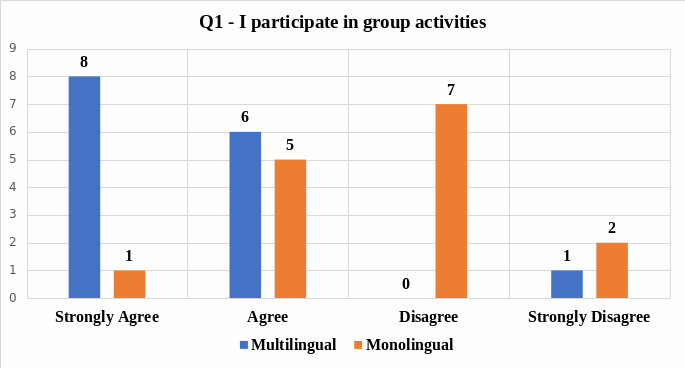
The results of this question showed that eight people from multilingual groups and only one representative of monolingual groups strongly agreed to participate in group activities. In multilingual groups, six people agreed and one person strongly disagreed to participate in activities. In monolingual groups, five people agreed, seven people disagreed, and two people strongly disagreed.
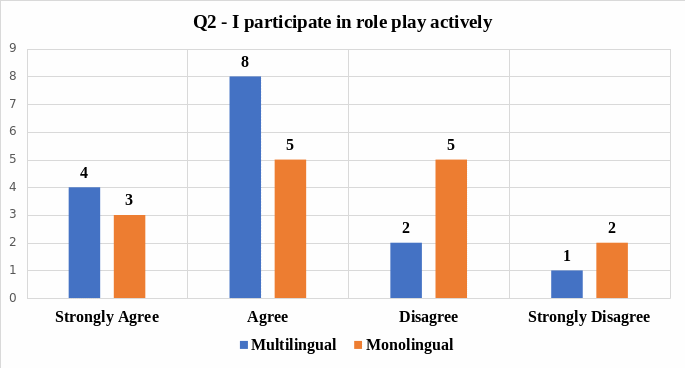
The results of this question show that in multilingual groups four people strongly agreed, eight people agreed, two people disagreed, and one person strongly disagreed to participate in role play actively. In monolingual groups three people strongly agreed, five people agreed and another five disagreed, and two people strongly disagreed.
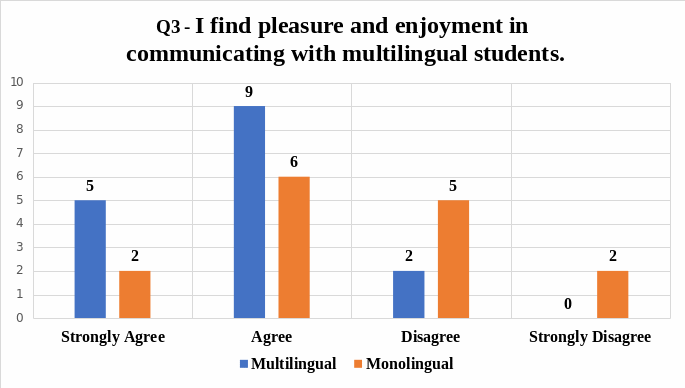
The results of this question show that in multilingual groups five people strongly agreed, nine people agreed, two people disagreed, and nobody strongly disagreed that they found pleasure and enjoyment in communicating with multilingual students. In monolingual groups two people strongly agreed, six people agreed, five people disagreed, and two people strongly disagreed.
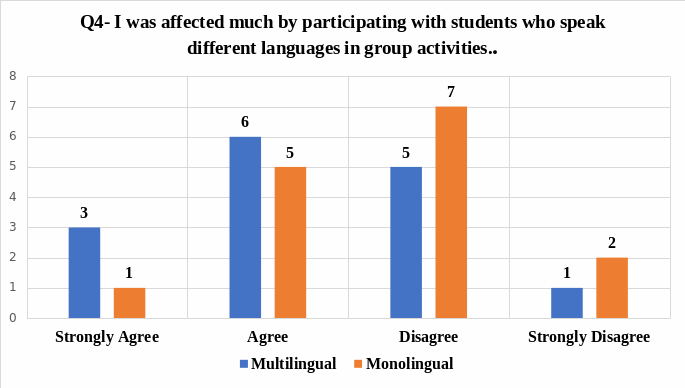
The results of this question showed that in multilingual groups three people strongly agreed, six people agreed, five people disagreed, and one person strongly disagreed that they were affected much by participating in group activities with students who spoke different languages. In monolingual groups one person strongly agreed, five people agreed, seven people disagreed, and two people strongly disagreed.
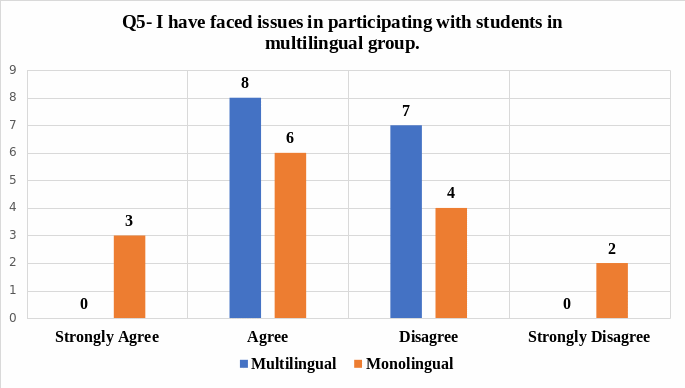
The results of this question showed that in multilingual groups nobody strongly agreed, eight people agreed, seven people disagreed, and nobody strongly disagreed that they faced difficulties in studying with multilingual students. In monolingual groups three people strongly agreed, six people agreed, four people disagreed, and two people strongly disagreed.
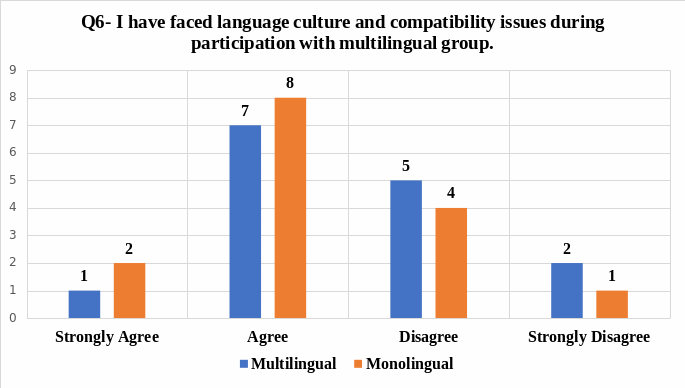
The results of this question showed that in multilingual groups one person strongly agreed, seven people agreed, five people disagreed, and two people strongly disagreed that they faced culture and compatibility issues studying with multilingual students. In monolingual groups two people strongly agreed, eight people agreed, four people disagreed, and one person strongly disagreed.
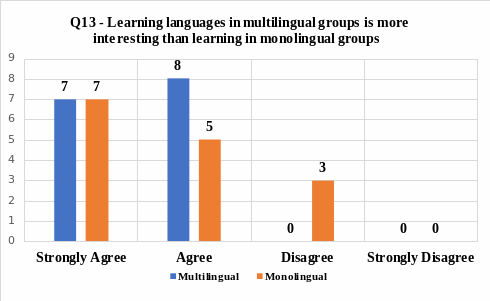
The results of this question were crucial for the current research because seven people from both groups strongly agreed that learning languages with multilingual students was more interesting than in monolingual groups.
The results of the two interviews showed that students in multilingual groups participated more in role play activities even if they were shy and self-reserved, while in monolingual groups, only talkative participants supported the discussions.
Discussion
In the research questionnaire, the participants were asked a series of questions to find out whether multilingual groups participated more willingly in role-play activities and group work than monolingual groups. All of twenty questions presented four variants of possible answers and excluded the possibility of partially filled questionnaires. The hypothesis of the study claimed that students in multilingual groups would participate more in role-play activities and group work than their peers from monolingual groups. The received feedback supported this proposition. Moreover, students from both groups strongly agreed that learning languages in multilingual surroundings was more engaging than in monolingual groups.
Preferences in Multilingual Groups
According to the results of the questionnaire, the majority of multilingual students strongly supported participating in group activities. They also agreed to participate actively in role-plays and found pleasure and enjoyment communicating with other students in their multilingual group. Nevertheless, at least one multilingual student strongly disagreed to participate both in role plays and group activities.
This result supported the proposition that people could hesitate to engage in multilingual communication out of ideological reasons (Tupas 2015). There was no common opinion about the impact and issues of multilingual communication among students. Notably, eight out of fifteen students faced issues in communicating with students in multilingual groups. The majority agreed that they were affected much by group activities. All of the students agreed that learning languages in multilingual groups were more interesting than in monolingual groups. These answers to the questionnaire in multilingual groups confirmed the hypotheses of the current research.
Preferences in Monolingual Groups
The results of the questionnaire showed that the majority of monolingual students disagreed to participate in group activities. Nevertheless, eight out of fifteen students agreed to participate in role play activities. This result supported the idea that role-play activities helped students use the English language more frequently (Kumaran 2017). Only two students strongly agreed that they found pleasure and enjoyment in communicating with multilingual students because in the majority of cases they experience difficulties in communication with people talking different languages.
Pedagogical implications
The current research proved that group activities were very engaging and useful for the multilingual students. Therefore, language teachers should include role-play activities and group work in the study process even if they find these approaches difficult to implement and control (Kumaran 2017). Such activities will help even shy students to use the English language more frequently in their learning and everyday life.
Conclusion
Limitations of the study
As in the case with all studies, there seem to be some limitations of the current research, particularly due to the small sample size from the research. All the people that have participated in the research are students from the University of Sunderland, therefore, it cannot be asserted that the results of the questionnaire and the interview represent all multilingual or monolingual students. The interview has revealed that even timid students can actively participate in the role-play activities while talkative participants lead discussions in monolingual groups. Therefore, monolingual groups consisting of extrovert students possibly can participate in all activities on the level of multilingual groups.
Provisions for further research
The results of the questionnaire and the interview proved the hypotheses of the research that students in multilingual groups participate more willingly in group work and role-play activities than monolingual students. Further research is needed to explore the advantages and disadvantages of monolingual and multilingual groups in different activities. The current research shows that all students experience difficulties while studying in multilingual groups. The important question for further studies is whether they can overcome these difficulties sharing the same L1?
Reference List
Dafouz, E & Smit, U 2014, ‘Towards a dynamic conceptual framework for English-medium education in multilingual university settings’, Applied Linguistics, vol. 37, no. 3, pp. 397-415.
García, O & Lin, AM 2017, ‘Extending Understandings of Bilingual and Multilingual Education’, in O García, AM Lin, & S May Bilingual and Multilingual Education. Springer International Publishing, London, pp. 1-20.
Gorter, D 2015, ‘Multilingual interaction and minority languages: Proficiency and language practices in education and society’, Language Teaching, vol. 48, no. 1, pp.82-98.
Hofer, B & Jessner, U 2016, ‘Multilingualism at the primary level in South Tyrol: how does multilingual education affect young learners’ metalinguistic awareness and proficiency in L1, L2 and L3?’, The Language Learning Journal, pp.1-12.
Jessner, U 2014, ‘On multilingual awareness or why the multilingual learner is a specific language learner’, in M Pawlak & L Aronin (eds) Essential topics in applied linguistics and multilingualism. Springer International Publishing, London, pp. 175-184.
Kumaran, SR 2017, ‘Benefits and shortcomings of role-play as a speaking activity in English language classrooms’, The English Teacher, vol. 39, no. 22, pp. 72-93.
Mortensen, J 2014, ‘Language policy from below: language choice in student project groups in a multilingual university setting’, Journal of Multilingual and Multicultural Development, vol. 35, no. 4, pp. 425-442.
Sierens, S & Van Avermaet, P 2014, ‘Language diversity in education: Evolving from multilingual education to functional multilingual learning’, in D Little, C Leung, & P Avermaet (eds) Managing Diversity in Education: Languages, Policies, Pedagogies, pp.204-222.
Tupas, R 2015, ‘Inequalities of multilingualism: Challenges to mother tongue-based multilingual education’, Language and Education, vol. 29, no. 2, pp.112-124.
Weber, JJ 2014, Flexible multilingual education: Putting children’s needs first (Vol. 38). Short Run Press, London.